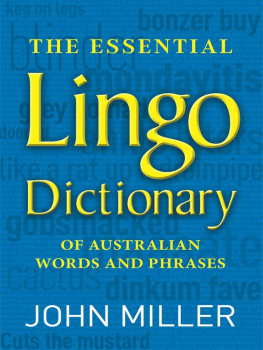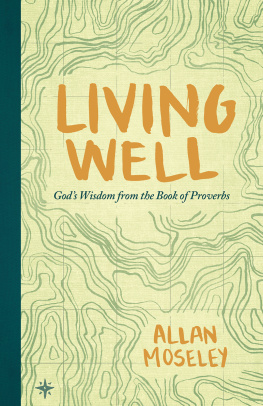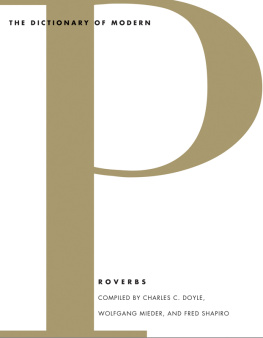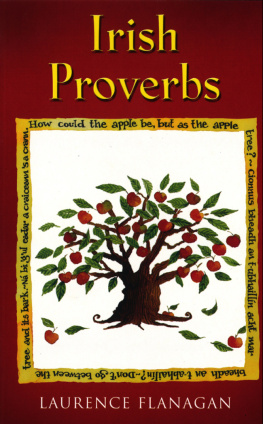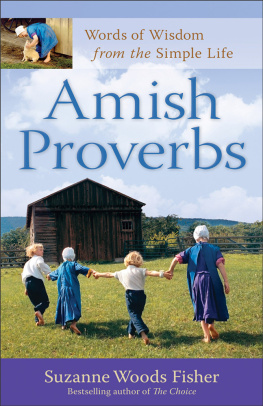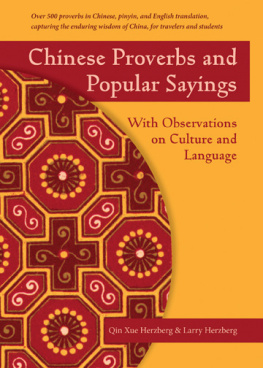The author particularly thanks Ian Watt, and also Graeme and Valerie Fisher, Geoffrey Pooch, Robbie Ancell, Joe Gilfillan, Nigel Horrocks, Steve Jennings, Paul Barrett, Graeme Hill and David Stevens.
Introduction
What is a proverb?
Its a tricky thing to define there are so many variables. However, perhaps this is a fair description:
Proverb: an expression which, in a few words, encapsulates a perceived piece of analysis or advice which is applicable within a particular cultural context, and regarded as wisdom through having been entrenched in usage for many years.
But can we feel sure that everything called a proverb can actually be regarded as wisdom? Only sometimes. All that glisters is not gold.
Cant argue with that.
However, other pithy quips identified as proverbs have less traction, and can be downright dodgy. Sometimes their wisdom might have worked well in a bygone era, but time has not treated them kindly. In the cold clear light of the 21st century, the advice given in some proverbs is open to question. For example:
A dog, a woman, and a walnut tree,
The more you beat them the better they be.
And these days the camera certainly can lie.
There is also an alarming number of proverbs which blatantly contradict each other. Take your pick:
Birds of a feather flock together
but
Opposites attract.
And is
Out of sight out of mind?
or does
Absence make the heart grow fonder?
(A 20th century update also exists: Absence makes the heart grow fonder for somebody else.)
Then there are the head-scratching proverbs. What can these examples possibly mean?
A dead bee maketh no honey.
A green yule makes a fat churchyard.
An apple, an egg and a nut, you may eat after a slut.
Does a cat really have nine lives? No it doesnt. But un-doubtedly there must once have been some reasoning behind the observation.
For several thousand years proverbs have been spoken in a portentous tone, chiselled into marble, embroidered by Jane Austen heroines onto framed linen or posted on handsome internet greetings. The very word itself summons involuntary respect, in spite of the difficulty in defining exactly what it is. But in addition, some pithy epigrams of perceived wisdom have gathered around the margins of the usual definition of proverb. Quotes and slogans, old wives tales and catchphrases even something as simple as the title of a successful book (e.g. Life Begins at Forty) have come into common usage and gained a kind of fragile truth, even if lacking the implied moral authority of traditional historic wisdom.
The present collection scratches the surface of several hundred proverbs, both familiar and obscure, and also includes some adages, maxims and epigrams which have crept into consideration newcomers on the block which carry a certain illusion of inherent advice, albeit sometimes of questionable basis. We take a close look at just how relevant they really are.
And remember:
If you would avoid suspicion, do not lace your shoes in a melon field.
Yeah, right.
Max Cryer
A proverb is to speech what salt is to food.
(Arabia)
Birth
We brought nothing into the world and it is certain we carry nothing out.
(1 Timothy 6: 7)
Its difficult to believe that anyone took seriously the ancient verse:
Born on Monday fair of face,
Born on Tuesday full of grace
Born on Wednesday sour and sad,
Born on Thursday merry and glad,
Born on Friday worthily given,
Born on Saturday work for a living,
Born on Sunday never know want.
A cheerful piece of advice comes from Haiti:
A monkey never thinks her baby is ugly.
When the mouse has had its fill, the meal turns bitter.
(Holland)
In Korea they assess the baby in a different way:
A newborn baby has no fear of tigers.
Africans confront a biological problem:
She who gives birth to triplets cannot ask for a third breast.
And in Morocco the concern is for the vegetable garden:
The pumpkin gives birth and the fence has the problem.
While Bulgarians are both pragmatic and fatalist:
Give me luck at my birth, then if you will throw me on the rubbish.
But while the Haitians may be cheerful and the Bulgarians pragmatic, some, including the Corsicans, view birth with a sense of deep gloom:
At birth your fate is written.
Do not use paper to wrap up fire.
(China)
The Arabs agree:
Only three things in life are certain birth, death and change.
And for the really gloomy, in 1660 the Rev. T. Fuller reminded us:
Birth is the beginning of death.
The German philosopher Arthur Schopenhauer was hardly optimistic in 1840:
After your death, you will be what you were before birth.
At least George Santayana could see some light in 1922:
There is no cure for birth and death except for the interval between.
Painted flowers have no scent.
(Holland)
Take your pick
St Matthew records Jesus as saying:
Ask and it shall be given to you.
(Matthew 7: 7)
In 1738, Jonathan Swift was more cynical:
The devil made askers.
He that would avoid old age must hang himself in youth.
(Yiddish)
Breeding
Nature or nurture? Nuggets of wisdom exist in most cultures, but together they form a confusing jumble of contradictions about the comparative importance of inheritance and behaviour.
Euripides was confident that
Noble fathers have noble children.
Those who agreed with him echoed the thought:
Like breeds like
which then became:
Like father, like son.
A girl with cotton stockings never sees a mouse.
(USA)
***
But some eighteen hundred years later, Noah Webster pointed out that
A good cow may have a bad calf
and traditional Scottish wisdom formed an optimistic opposite impression:
An ill cow may have a good calf.
Sticking with the farmyard metaphor is the old favourite:
There is a black sheep in every flock
and Native Americans have long held that
Not every sweet root gives birth to sweet grass.
So its clear that Like father, like son is not a universal truth.
A fog cannot be dispelled by a fan.
(Japan)
Arguments still fly either way. Do children follow the precepts, values and characteristics of their antecedents, or do circumstances and contexts contribute to the make-up of individuals who might not exactly reflect their parents?
Paroemiologia Anglo-Latina proclaimed in 1639:
Birth is much ... but breeding is more.
So possibly children dont necessarily reflect their parents characteristics. Since 1460 weve been told instead that
Manners make the man


